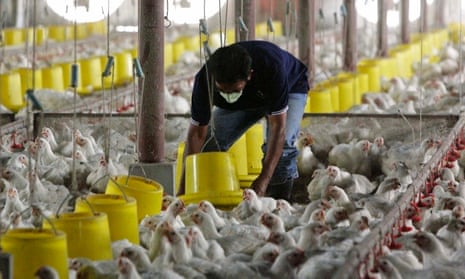A group of Burmese migrants will appear before a Thai court on Wednesday charged with defamation after complaining of labour abuses in Thailand’s multimillion-pound poultry export industry.
In a landmark case, the migrant workers could face up to a year in a Thai prison and heavy fines after reporting alleged mistreatment and abuse at a poultry farm.
Two of the 14 workers are also facing separate theft charges, for taking their timecards to local police officials as alleged evidence of long working hours. If convicted, they face an additional fine and up to seven years’ imprisonment.
The Burmese migrants allege they were forced to work 22-hour days at Thammakaset Farm 2, at times having to sleep in the chicken sheds with 30,000 hens. They also said their freedom of movement was severely restricted.
Thammakaset Farm 2, in Lopburi, central Thailand, has continually denied the allegations. The farm owner filed defamation charges against the workers after the Thai authorities said they would not press charges following a police investigation.
Lawyers representing the owner of Thammakaset Farm 2 refused multiple Guardian requests for comment.
Campaigners said the criminal court proceedings against the workers are an attempt to silence criticism and protect corporate interests, despite a Thai government move in recent months to promote better migrant rights.
“These prosecutions undermine the confidence and ability not only of human rights defenders and researchers, but also migrants themselves, to speak out [against alleged abuses],” said British activist Andy Hall of the Thailand-based Migrant Workers Rights Network, which is providing humanitarian and legal assistance to the 14 Burmese workers.
“As a result, Thailand’s important and well publicised efforts to systematically or genuinely address migrant worker exploitation are seriously undermined as migrants cannot speak up.”
Hall said that he is also being sued for defamation by the owners of Thammakaset Farm 2 for helping launch a social media campaign publishing the farmworkers’ claims.
Thailand, one of the world’s biggest chicken exporters, is better known for its troubled seafood industry, rife with practices akin to modern-day slavery. But its poultry industry – which exports about 40% of its broiler poultry meat production to Europe – has also faced persistent allegations of abuse, debt bondage, high recruitment fees, long working hours and abysmal pay.
“I’d always heard that work in Thailand was better paid than in Myanmar, but when I got to the farm it wasn’t at all what I imagined: my wages were much lower than I expected, and I had no freedom, I couldn’t leave the farm,” said Saw Yen, one of the two workers being prosecuted for theft.
“I can’t believe the owner is suing us. My family is terrified something terrible will happen to me, and it’s extra worrying because I’ve got two charges against me. As soon as this is all over, I just want to go back home [to Myanmar].”
In Thailand a growing number of defamation cases have been brought against journalists, human rights defenders and whistleblowers in recent years, many of them through a vaguely worded computer crimes act that has seen people successfully prosecuted for sharing opinions in online chatrooms or “liking” Facebook posts.
Defamation is a criminal, rather than civil, matter in Thailand. Since the military took power in 2014, there have been hundreds of prosecutions using the computer crimes act. Activists worry that revisions to the act – due to come into effect this month – will further cripple free speech.
“We are seeing more self-censorship among civil society on sensitive work because of the higher recognition that a [computer crimes act] prosecution could bring,” said Asia deputy director for Human Rights Watch, Phil Robertson. “This is an absolute disaster for freedom of expression in Thailand.”
Lawyer Nakhon Chompuchat, who is representing Hall and the migrant workers, said: “This is the first case where migrant workers have been prosecuted for criminal defamation. This is a new kind of challenge for the protection of human rights, not only for migrant workers themselves, but also for those seeking to protect migrants’ rights.”
- This reporting is supported by Humanity United
